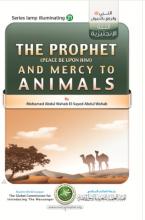The Prophet of Mercy Website
Muslim World League - Global Commission for Introducing the Messenger
The Prophet (peace be upun him) preferred to travel early in the morning, and on a Thursday.
He (peace be upun him) disliked for someone alone to travel at night, and disliked that a person travel alone.
He (peace be upun him) instructed that when travellers are three in number they should appoint one of them as their leader.
When he (peace be upun him) mounted his camel he would say, "Allaahu akbar" three times, and then: ''Subhaan-alladhee sakhkhara lana haadha wa ma kunna lahu muqrineen. Wa inna ila rabbina lamunqaliboon. (Glorified is He who subjugated this for us, for [otherwise] we could not have subdued it. And indeed, to our Lord we will surely return.) Then he would supplicate: "O Allah, we ask of You in this journey of ours righteousness and piety and deeds that please You. O Allah, facilitate this journey of ours and fold up [i.e., shorten] for us its distance. You are the companion in travel and the caretaker in the family. O Allah, be with us in our journey and look after our families."
When he returned he would repeat the same supplication but add: “'aayiboona, taa'iboona, `abidoona, li-rabbinaa haamidoona' (We are returning, repenting, worshipping and praising our Lord.”
When ascending hills he (peace be upun him) would say, "Allahu akbar" and when he descended into valleys he would say, "Subhaan-Allah." A man said: "I intend to travel." So the Prophet (peace be upun him) said: "I instruct you to be conscious of Allah, and to say, 'Allahu akbar' at every high point."
When dawn appeared during a journey he (peace be upun him) would say: “A listener has heard our praise of Allah for His testing us with good things. Our Lord, be with us and favour us. I seek refuge in Allah from the Hellfire.”
When he (peace be upun him) bade farewell his companions who were leaving on a journey, he would say to them: “To Allah I commit your religion, your trust, and your final deeds [before death].”
He (peace be upun him) said: “When one of you stops at a place on his way, he should say: “A`udhu bikalimaat-illaahit-taammati min sharri ma khalak" (I seek refuge in the perfect words of Allah from the evil of what He created). For then nothing will harm him until he leaves that place."
He (peace be upun him) instructed that the traveller who had fulfilled the purpose of his journey should hasten to return to his family.
He (peace be upun him) used to forbid a Muslim woman to travel without a mahram, even for a distance of about 12 miles. He also forbade carrying the Qur'an in enemy land for fear of its being taken by the enemy.
He (peace be upun him) forbade Muslims to live among polytheists when they are able to migrate. He (peace be upun him) said: “I am disassociated from a Muslim who [chooses to] live among the polytheists.”
He also said: “Whoever keeps company with a polytheist and shares a lodging with him is like him.”
He (peace be upun him) travelled four times: for the Hijrah (emigration), for jihad, (and this was the most frequent), for Umrah and for Hajj.
During his journey he (peace be upun him) used to shorten the four rak`ah prayer and pray it as two from the time he left and until his return. He (peace be upun him) would only pray the obligatory prayers, except for the witr prayer and the sunnah before the fajr prayer.
He (peace be upun him) did not specify any distance for his people beyond which to shorten prayers or to break the fast.
It was not from his guidance to join obligatory prayers while riding or while camping during a journey. He would only join prayers while actually travelling or when setting out on his journey immediately after a prayer time. When he set out before noon he would delay thuhr prayer until the time for `asr prayer, and would then dismount and combine the two prayers. But if the time for thuhr prayer came before he began the journey, he would pray it first and then travel. When he was travelling fast he would delay the maghrib prayer until the time for `ishaa' and join them then.
He (peace be upun him) used to perform voluntary prayers by day and by night during travel, while riding his camel. He (peace be upun him) would face the direction in which he was going and perform ruku` and sujood by bowing his head. He (peace be upun him) would lower it more in sujood than in ruku`.
He (peace be upun him) once travelled in Ramadhan and broke his fast, but gave his companions the choice between fasting and not fasting.
He (peace be upun him) always or usually wore leather footwear during a journey.
He (peace be upun him) prohibited that upon returning after a long absence a man would knock on the door of his house at night.
He (peace be upun him) said: "Angels will not accompany a group [of travellers] among whom is a dog or a bell."
When he (peace be upun him) returned from a journey, he would stop first at the mosque and pray two rak`ahs. He was welcomed first by the children of the household.
He (peace be upun him) used to embrace one returning from a journey and would kiss him if he was from his family.
******






